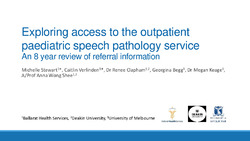Please use this identifier to cite or link to this item:
http://hdl.handle.net/11054/1481| Title: | Exploring access to the outpatient paediatric speech pathology service – an 8 year review of referral information. |
| Author: | Verlinden, Caitlin Begg, Georgina Stewart, Michelle Keage, Megan Wong Shee, Anna Clapham, Renee |
| Issue Date: | 2019 |
| Conference Name: | Ballarat Health Services 2019 Annual Research Symposium |
| Conference Date: | 28 November |
| Conference Place: | Ballarat |
| Abstract: | Background BHS provides speech pathology services for children in the Ballarat and surrounding area. The percentage of “developmentally vulnerable” children for language and communication skills in the area is increasing. Untreated childhood communication difficulties are associated with longer term issues related to health, education and employment. Objectives/Aims To identify and quantify the extent that systematic barriers restrict people accessing BHS paediatric speech pathology services. Part 1 of this study explores access to the service for children aged 0-6 years. Method Audit of service information for children referred to the Speech Pathology Paediatric Community Health Program (2010-2018; excluding Paediatric CRC referrals). Descriptive statistics of demographic (e.g. age), referral (e.g. referral reason) and service data (e.g. appointment wait times) was conducted to explore referral patterns and change over time. Results The majority of referrals (n=1567) were for children aged 2-3 years (47%), lived in Ballarat (75%) and were referred by maternal and child health services (36%). Most referrals were for speech difficulties (42%). On average there was a 9% annual increase in referrals, however there was considerable annual variability (SD 24%). Reason for referral varied by child age: Peak referrals for feeding difficulties was <1 years, language difficulties was 2 years, speech difficulties was 3 years and stuttering was 3 years. The majority of children had appointments within 0-6 months (51%), however 21% had wait times over 12 months. Children referred for communication difficulties generally had longer wait times than children referred for feeding difficulties. Referrals for children aged 4-6 years were often not accepted due to service eligibility (21%) and those that were seen, generally received <5 sessions before discharge. Implications/Outcomes for Planned Research Project Wait times are a significant barrier to people accessing the service. Wait time for an initial appointment is above national averages, particularly for children aged 2-3 years. Although older children had shorter wait times, they likely did not receive optimal Speech Pathology support due to no longer being eligible for the service. Final Thoughts Phase two of this project will engage with caregivers to investigate barriers and facilitators to the service. The combined information from the two project phases with guide service changes to decrease service access barriers. |
| URI: | http://hdl.handle.net/11054/1481 |
| Internal ID Number: | 01422 |
| Health Subject: | SPEECH PATHOLOGY DEVELOPMENTALLY VULNERABLE WAIT TIMES SPEECH DIFFICULTY |
| Type: | Conference Presentation |
| Appears in Collections: | Research Output |
Files in This Item:
| File | Description | Size | Format | |
|---|---|---|---|---|
| 5. Verlinden, Caitlin & Stewart, Michelle.pdf | Powerpoint | 347.79 kB | Adobe PDF |  View/Open |
Items in DSpace are protected by copyright, with all rights reserved, unless otherwise indicated.
